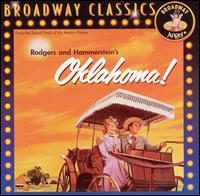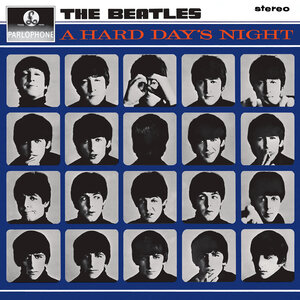
A Hard Day's Night is the third studio album by the English rock band the Beatles, released on 10 July 1964 by Parlophone, with side one containing songs from the soundtrack to their film of the same name. The American version of the album was released two weeks earlier, on 26 June 1964 by United Artists Records, with a different track listing that included selections from George Martin's film score. In contrast to the Beatles' first two albums, all 13 tracks on A Hard Day's Night were written by Lennon and McCartney, showcasing the development of their songwriting partnership.
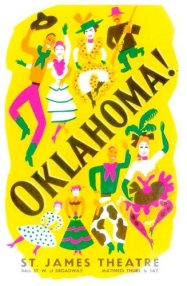
Oklahoma! is the first musical written by the duo of Rodgers and Hammerstein. The musical is based on Lynn Riggs' 1931 play, Green Grow the Lilacs. Set in farm country outside the town of Claremore, Indian Territory, in 1906, it tells the story of farm girl Laurey Williams and her courtship by two rival suitors, cowboy Curly McLain and the sinister and frightening farmhand Jud Fry. A secondary romance concerns cowboy Will Parker and his flirtatious fiancée, Ado Annie.

MGM Records was a record label founded by the Metro-Goldwyn-Mayer film studio in 1946 for the purpose of releasing soundtrack recordings of their musical films. It transitioned into a pop music label that continued into the 1970s. The company also released soundtrack albums of the music for some of their non-musical films as well, and on rare occasions, cast albums of off-Broadway musicals such as The Fantasticks and the 1954 revival of The Threepenny Opera. In one instance, MGM Records released the highly successful soundtrack album of a film made by another studio, Columbia Pictures's Born Free (1966).

Albert Gordon MacRae was an American actor, singer, and television and radio host. He appeared in the film versions of two Rodgers and Hammerstein musicals, Oklahoma! (1955) and Carousel (1956), and played the leading man opposite Doris Day in On Moonlight Bay (1951) and sequel By The Light of the Silvery Moon (1953).
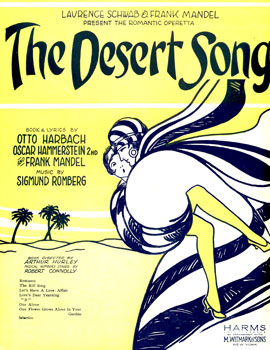
The Desert Song is an operetta with music by Sigmund Romberg and book and lyrics by Oscar Hammerstein II, Otto Harbach and Frank Mandel. It was inspired by the 1925 uprising of the Riffs, a group of Berber fighters, against French colonial rule in Morocco. It was also inspired by stories of Lawrence of Arabia aiding native guerrillas. Many tales romanticizing Saharan North Africa were in vogue, including Beau Geste and The Son of the Sheik.
A cast recording is a recording of a stage musical that is intended to document the songs as they were performed in the show and experienced by the audience. An original cast recording or OCR, as the name implies, features the voices of the show's original cast. A cast recording featuring the first cast to perform a musical in a particular venue is known, for example, as an "original Broadway cast recording" (OBCR) or an "original London cast recording" (OLCR).
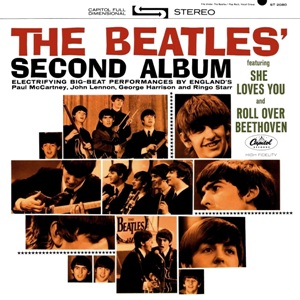
The Beatles' Second Album is the second Capitol Records album by the English rock band the Beatles, and their third album released in the United States including Introducing... The Beatles, which was issued three months earlier by Vee-Jay Records. Following its release in April 1964, The Beatles' Second Album replaced Meet the Beatles! at number 1 on the Billboard Top LPs chart in the US. The album was compiled mostly from leftover tracks from the UK album With the Beatles and Long Tall Sally EP, which are predominantly rock and roll and R&B covers, and rounded out with several Lennon-McCartney-penned non-album b-sides and the hit single "She Loves You". Among critics, it is considered the band's purest rock and roll album and praised for its soulful takes on both contemporary black music hits and original material.

"I Call Your Name" is a song recorded by the English rock band the Beatles and credited to Lennon–McCartney. It was written primarily by John Lennon, with assistance from Paul McCartney. It was released in the US on The Beatles' Second Album on 10 April 1964 and in the UK on the Long Tall Sally EP on 19 June 1964. On 7 March 1988, the song appeared on Past Masters, a compilation album that includes every song commercially released by the band that was neither included on the 12 UK studio albums nor the US Magical Mystery Tour LP, meaning that "I Call Your Name" appeared for the first time on a core catalogue album.

Yellow Submarine is the tenth studio album by English rock band the Beatles, released on 13 January 1969 in the United States and on 17 January in the United Kingdom. It is the soundtrack to the animated film of the same name, which premiered in London in July 1968. The album contains six songs by the Beatles, including four new songs and the previously released "Yellow Submarine" and "All You Need Is Love". The remainder of the album is a re-recording of the film's orchestral soundtrack by the band's producer, George Martin.
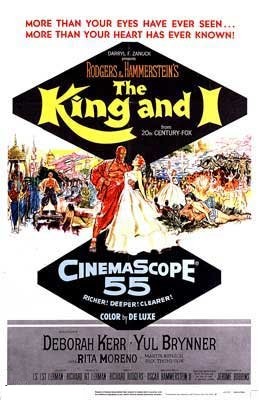
The King and I is a 1956 American musical film made by 20th Century-Fox, directed by Walter Lang and produced by Charles Brackett and Darryl F. Zanuck. The screenplay by Ernest Lehman is based on the 1951 Rodgers and Hammerstein musical The King and I, which is itself based on the 1944 novel Anna and the King of Siam by Margaret Landon. That novel in turn was based on memoirs written by Anna Leonowens, who became school teacher to the children of King Mongkut of Siam in the early 1860s. Leonowens' stories were autobiographical, although various elements of them have been called into question. The film stars Deborah Kerr and Yul Brynner.
"I've Grown Accustomed to Her Face" is a song from the 1956 musical My Fair Lady, with music by Frederick Loewe and lyrics by Alan Jay Lerner. It was originally performed by Rex Harrison as Professor Henry Higgins who also performed it in the 1964 film version.
"Makin' Whoopee" is a jazz/blues song, first popularized by Eddie Cantor in the 1928 musical Whoopee!. Gus Kahn wrote the lyrics and Walter Donaldson composed the music for the song as well as for the entire musical.
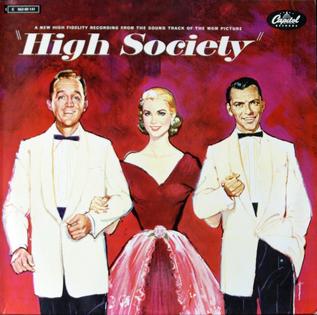
High Society is a 1956 soundtrack album, featuring Bing Crosby, Frank Sinatra, Louis Armstrong and Grace Kelly. This was Crosby's fifth LP album, and his first recorded for Capitol Records. It was the soundtrack for the MGM feature film High Society, also released in 1956. Initially issued on vinyl either in mono or stereo format, the album has been issued on CD by Capitol in Japan in 1991 and by Capitol in the UK in 1995. The album was also included in a 3-CD box set called "Original Soundtrack Recordings" issued by the EMI Music Group Australasia

Oklahoma! is a 1955 American musical film based on the 1943 musical of the same name by Richard Rodgers and Oscar Hammerstein II, which in turn was based on the 1931 play Green Grow The Lilacs written by Lynn Riggs. It stars Gordon MacRae, Shirley Jones, Rod Steiger, Charlotte Greenwood, Gloria Grahame, Gene Nelson, James Whitmore, and Eddie Albert. The production was the only musical directed by Fred Zinnemann. Oklahoma! was the first feature film photographed in the Todd-AO 70 mm widescreen process.

Carousel is a 1956 American drama fantasy musical film based on the 1945 Rodgers and Hammerstein stage musical of the same name, which in turn was based on Ferenc Molnár's 1909 non-musical play Liliom. The film stars Gordon MacRae and Shirley Jones and was directed by Henry King.

"Will the Circle Be Unbroken?" is a popular Christian hymn written in 1907 by Ada R. Habershon with music by Charles H. Gabriel. The song is often recorded unattributed and, because of its age, has lapsed into the public domain. Most of the chorus appears in the later songs "Can the Circle Be Unbroken" and "Daddy Sang Bass".

Three Sailors and a Girl is a 1953 American Technicolor musical film made by Warner Bros. It was directed by Roy Del Ruth and written by Devery Freeman and Roland Kibbee, based on the George S. Kaufman play The Butter and Egg Man. Ray Heindorf was the musical director, with orchestrations by Gus Levene, and vocal arrangements by Norman Luboff. Choreography was by LeRoy Prinz.
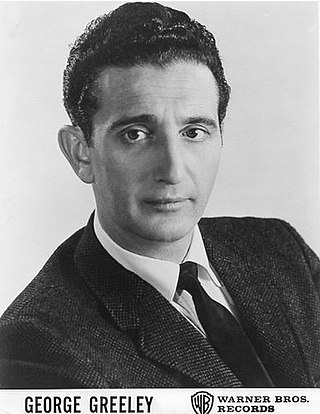
George Greeley was an Italian-American pianist, conductor, composer, arranger, recording artist and record producer who is known for his extensive work across the spectrum of the entertainment industry. Starting as an arranger and pianist with several notable big bands in the 1940s, he segued into the Hollywood radio scene, working on several nationally broadcast variety programs. After conducting an Army Air Force Band during World War II, he was hired by Columbia Pictures as a staff pianist and orchestrator. He worked as pianist on several hundred motion pictures, worked with many famous composers orchestrating their soundtrack compositions, and created original compositions of his own in several dozen movies. It was Greeley's hands that performed the piano parts that Tyrone Power mimed in The Eddy Duchin Story. Concurrent with his work at Columbia Pictures, George Greeley also worked at Capitol Records as music director, pianist, and conductor for many artists such as Gordon MacRae, Jane Powell, Jo Stafford, Frankie Laine, and Doris Day. He was hired in the late 1950s by the newly established Warner Brothers Records. George Greeley arranged, orchestrated and performed as primary artist for a series of hit recordings entitled "Popular Piano Concertos." As music tastes changed in the late 1960s, Greeley had already moved into television, composing themes and music for popular TV series like My Favorite Martian,The Ghost and Mrs. Muir,Nanny and the Professor, and Small Wonder. He performed as featured piano soloist and as guest conductor in concert appearances around the world. He died from emphysema at age 89 in Los Angeles, California.

"On a Clear Day (You Can See Forever)" is a song written by Burton Lane (music) and Alan Jay Lerner (lyrics) for the 1965 Broadway musical On a Clear Day You Can See Forever. It was subsequently performed by American actress and vocalist Barbra Streisand in the 1970 film adaptation of the musical.

The Music from Oklahoma! was Nelson Riddle's first studio album in his own right, released in 1955, after successful collaborations with Nat King Cole and Frank Sinatra for Capitol Records.
